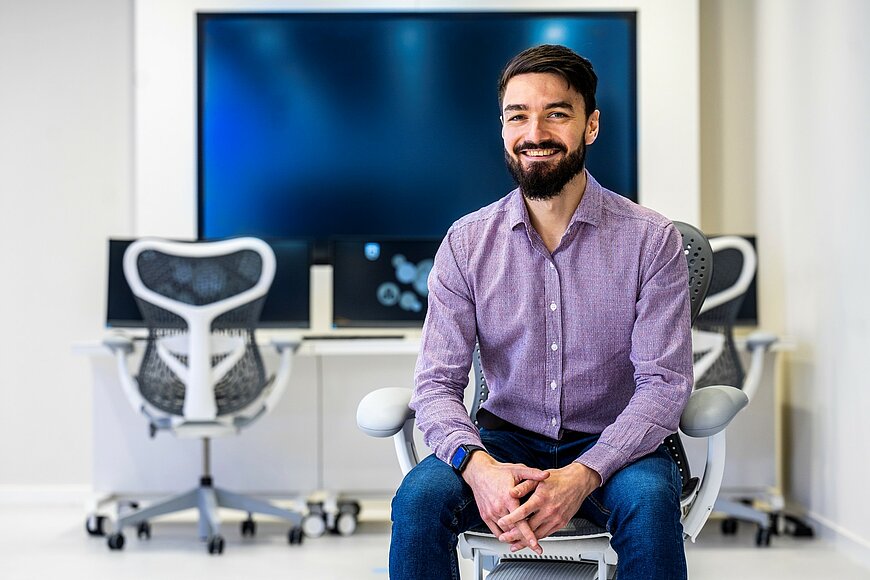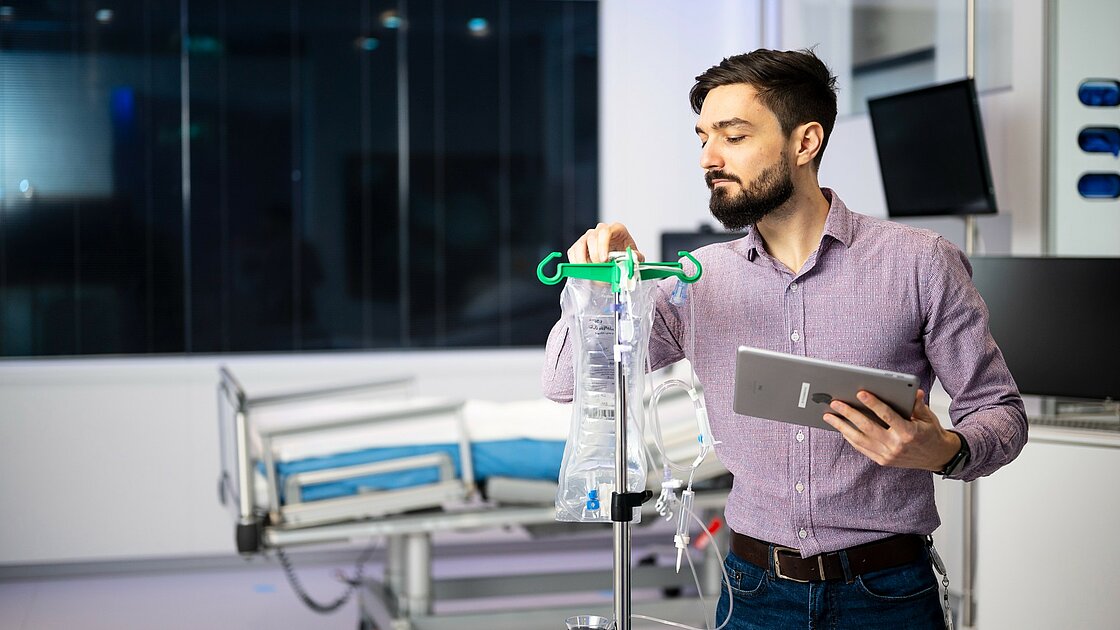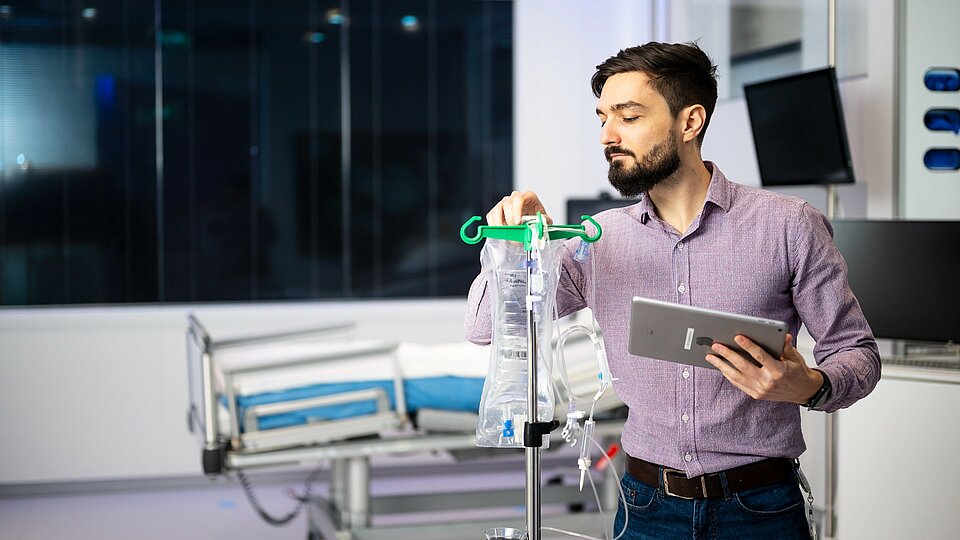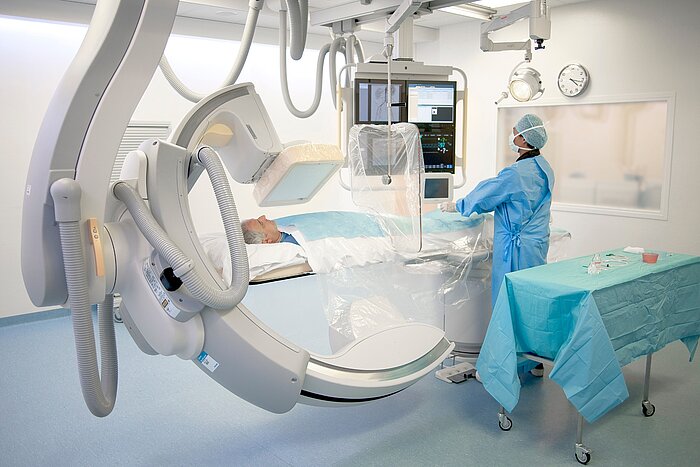Help hospitals optimize care by analyzing data
Alexander Furnica from Romania works at Philips as a Data Scientist at the Research Department. Together with a relatively small team and in close collaboration with hospitals he works on collecting and analyzing data to help hospitals optimize efficiency in their daily routines and workflows. The project is a great match with Alexander’s interests and expertise. He got to know it through Philips’ traineeship program which he feels is a great way to start a career. ‘The program is open and offers great flexibility. Philips helps you to get the best out of yourself.’

“I work on analyzing data of Philips’ devices and general healthcare data to improve our services and workflows in healthcare,” Alexander explains. “The main project that I am currently working on concerns analyzing the data that we gather in hospitals by using sensors. These sensors are placed on for instance patients, hospital staff and medical assets. Our goal is to improve logistics in hospitals to make it as efficient as possible by offering insights into their workflows. An area of business that currently draws a lot of attention.”
From research project to commercial service
“I have been working on this project for quite some time. For me, it started as an experiment with a clear concept in mind and is one of the pilots of a large-scale European project: BigMedilytics (Big Data for Medical Analytics) aimed at improving European healthcare through big data. At a later moment, it was further developed via an internal accelerator program and embraced by the business. A year ago, it became a commercial service that Philips now actively offers hospitals in various market. It is called: PerformanceFlow.”


Close contact with hospitals for data-interpretation and optimization
“The contact with commercial partners is now in hands of other colleagues. From a research point of view, I currently focus on further development of the analytics and techniques. To do so I work with multiple disciplines and have close contact with the hospitals that are our research partners. The contact that I have with hospitals is mostly about data interpretation. I can provide them with asset utilization rates, but we also need to understand what it means. A correct interpretation demands their experience and expertise. Moreover, they often come with new ideas for optimization.”
Finding a balance between sufficient stock and preventing waste
“We for instance work together with a hospital to improve its operation of assets. It has a great number of assets such as wheelchairs, infusion pumps and so on. It also wants to be sure that the number of assets is abundant so that they never run out of the equipment they need, on the other hand stocks or assets that are not in use cost money. By gathering data, along privacy guidelines of course, and accordingly analyzing the usage we make the department as efficient as possible without waste.”
Remarkable pattern that looked like unreal behavior
“The work is challenging and fascinating at the same time. I, for instance, once found a remarkable pattern in data that we had been collecting for quite some time. The data gave the impression that the patients were running around the hospital. As it looked like unreal behavior to me, we further investigated it together with the hospital. Soon it turned out that the nurses kept the sensors in their pockets to be able to place them on the patients quickly, without realizing that the sensors were being read continuously.”
Small team with multiple disciplines
“Within Philips I work with a relatively small team. It consists of a product owner, two data scientists, someone who is responsible for hardware, someone who is responsible for business value proposition creation and someone who manages the internal communication and alignment with the European Commission and our research partners.”
Philips traineeship offered a chance to look around
“I joined Philips after I had graduated from Rotterdam School of Management where I studied international business administration and information management. I looked for a traineeship as I believe that is a good way to really get to know a company. Philips offers these kinds of traineeships and when I applied, I was hired. During the traineeship I worked on several assignments. This offered me the opportunity to look around and experience what kind of work suited me best. I started at Philips IT and then I explored business development for the Dutch market organization. In that position Dutch was a challenge, since day-to-day vocabulary was not sufficient to speak in a hospital setting. I then switched to the sensor project and that was a great match.”
Philips wants you to get the best out of yourself
“The good thing about working at Philips is that there are a lot of ways in which you can develop yourself and a lot of opportunities. The traineeship program is open and offers great flexibility. Philips simply wants you to get the best out of yourself. Moreover, you get to network a lot and meet a lot of people. The program is a great way to start your career.”
High quality of education in the Netherlands
“I came to the Netherlands for my study at Rotterdam School of Management (RSM). I chose the study for several reasons, firstly because the Netherlands offers high quality of education which also is very affordable for EU citizens. Besides that, my dad had also studied at RSM and was very satisfied about his education. And finally, what also is a great advantage is that everyone speaks English here, so it is very easy to get by.”
People speak English and are open to internationals
“I really enjoyed my study and living in the Netherlands as a student. People here are very open to internationals, everyone speaks English and I can go everywhere I want to go by bike. Moreover, the pay is very good here compared to Romania and there are a lot of tech companies and job opportunities for people with a background in STEM, especially in the Eindhoven area. So, after I had graduated, I wanted to stay in the Netherlands.”
Compact area that has all necessary ingredients
“Living here in the Brainport Eindhoven region is also good. I already lived in the Netherlands when I decided to move to Eindhoven, therefore it was not difficult for me to settle in. The city of Eindhoven is a compact area although it feels like being in a large city. I don’t feel it lacks much although finding a house in the Netherlands in general can be quite difficult. There is considerable pressure on the Dutch housing market. What I really love is that you can bike everywhere. I work at High Tech Campus and live on the other side of the city. Nevertheless, I can reach it by bike within 30 minutes.”
Lots of different cultures and abundance of tech opportunities
The area offers a lot of tech opportunities and I enjoy that it is such an international region. I love being in such an international environment with all its different cultures. We have met a lot of like-minded people in Eindhoven that are now our friends, among others via the Dutch class that my girlfriend was taking. Feeling at home somewhere to me is more about the people then about the place. “
